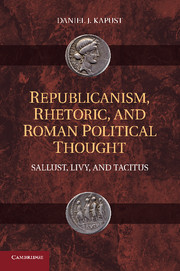Book contents
- Frontmatter
- Contents
- Acknowledgments
- 1 Introduction
- 2 An Ambiguous Republican
- 3 Channeling Conflict through Antagonistic Rhetoric in the War with Catiline
- 4 Exemplarity and Goodwill in Livy's From the Founding of Rome
- 5 Tacitus on Great Men, Bad Rulers, and Prudence
- 6 Tacitus' Moral Histories
- Epilogue
- Bibliography
- Index
- References
1 - Introduction
Published online by Cambridge University Press: 03 May 2011
- Frontmatter
- Contents
- Acknowledgments
- 1 Introduction
- 2 An Ambiguous Republican
- 3 Channeling Conflict through Antagonistic Rhetoric in the War with Catiline
- 4 Exemplarity and Goodwill in Livy's From the Founding of Rome
- 5 Tacitus on Great Men, Bad Rulers, and Prudence
- 6 Tacitus' Moral Histories
- Epilogue
- Bibliography
- Index
- References
Summary
SETTING THE STAGE
In his dialogue Brutus, written in 46 BCE, Cicero describes the deep pain he experienced at the death of Quintus Hortensius four years earlier. Hortensius was not only a friend, but like a father to Cicero: A distinguished man of like political sympathies when there was a “great dearth of wise and patriotic citizens,” he passed in a time of grave public danger. Hortensius was also “a comrade and fellow-worker in the same field of glorious endeavor” – namely, the endeavor of eloquent speaking. Hortensius had been one of Rome's leading orators; the young Cicero “had to outdo him, if he wished to take over this position” – and he did in the trial of Gaius Verres in 70 BCE. Yet despite his grief at the passing of his friend, Cicero suggests that he passed “opportunely”; had he lived longer, he would have been “able only to lament the fate of his country, not to help it.”
Had Hortensius lived to the time in which Cicero wrote Brutus, he, like other “good and loyal men” – bonis et fortibus civibus – would “mourn the loss of many things.” In particular, Hortensius would be saddened at “the spectacle of the Roman forum … robbed and bereft of that finished eloquence worthy of the ears of Rome or even of Greece,” emptied of eloquence by the rule of Caesar.
- Type
- Chapter
- Information
- Republicanism, Rhetoric, and Roman Political ThoughtSallust, Livy, and Tacitus, pp. 1 - 26Publisher: Cambridge University PressPrint publication year: 2011



